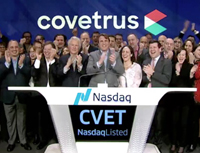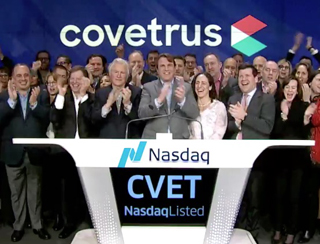
Covetrus NASDAQ 320

Screenshot from Nasdaq Facebook video
Covetrus executives and directors celebrated the company being listed on the Nasdaq on Feb. 8, 2019. It goes by the ticker symbol CVET.
There were smiles all around when Covetrus President and CEO Benjamin Shaw pressed the opening bell for the Nasdaq on Feb. 8, 2019. Company executives and directors cheered and clapped as confetti rained down during the first few seconds of trading for the new entity, which aspires to be a major force in the business of veterinary medicine.
One year later, the stock price is down nearly 70%, investors claiming fraud are suing the company and Shaw is out as CEO.
By all accounts, it's been a tumultuous first year for a company formed from the union of a well-established player in the veterinary sphere — Henry Schein Inc.'s animal health division — and a brash newcomer calling itself Vets First Choice. Henry Schein Animal Health was one of the largest distributors of veterinary products in the country and a major purveyor of practice management software. Vets First Choice was an online veterinary pharmacy, prescription management and data analytics business. As Covetrus, the new company counted 90% of U.S. veterinary practices as consumers in some capacity (with customers in Canada, Europe, Australia, New Zealand, China and Brazil, as well), according to information provided by Covetrus. Together, the companies had $4 billion in sales in 2018.
The majority of veterinarians commenting on the merger on message boards of the Veterinary Information Network, an online community for the profession, did not celebrate the news. Faced with steady consolidation across the industry, they expressed concern that the merger would further reduce the already dwindling number of providers of products and services. Some questioned how the two very different companies — a multibillion dollar public company with eight decades in the veterinary industry and a private tech start-up with a reputation for aggressive sales tactics — would work together. They wondered which corporate culture would prevail.
Investors, however, were bullish. Spruce Point Capital Management, a hedge fund in New York City, called the merger "the fastest growing play in the hot animal space" and predicted the share price, which closed its first day of trading at $41.01, could reach $106. Behemoths Morgan Stanley Investment Management, BlackRock Fund Advisors and The Vanguard Group Inc. collectively invested hundreds of millions in Covetrus stock.
The next 12 months unfolded very differently from Wall Street predictions. Benjamin Wolin, who took over as president and CEO in October, has described Covetrus' first year as a "mixed bag." He told the VIN News Service last week: "It was definitely a challenging year one for Covetrus. We tried to do too much in terms of integration. We certainly had a challenge trying to manage expectations of the stock market and that led to some bumpy months and quarters coming out of the gate."
He remains positive about the Covetrus model, bolstered by third-quarter revenues that exceeded analysts' predictions. "Why the companies were brought together still very much holds true," he said, adding that the company is "starting to deliver on the long-term promise of bringing these assets together."
'On track'
The Covetrus pitch is that the merger provides a full suite of integrated veterinary practice management products and services that increase efficiencies and profits for veterinarians who are their customers, which, in turn, profits the company. One of the largest distributors of veterinary supplies, Covetrus also is a major provider of software for practice information management (most notably AVImark, ImproMed and eVetPractice), client communications and inventory management. On the pharmacy side, Covetrus provides practice-branded online pharmacies with home delivery for pet owners and prescription management tools. Its business services include credit card processing and equipment leasing.
Two separate industry watchers — John Volk of Brakke Consulting, a management consulting company focusing on animal health; and David Westenberg, an analyst at New York investment firm Guggenheim Partners — described melding the companies as a hugely difficult proposition. Both pointed to the company's challenge of having to satisfy "many masters," including veterinarians, manufacturers and pet owners. They also pointed to the added hurdle of launching with $1 billion in debt.
Covetrus site 320

Photo by John Ewing
Covetrus is building a new headquarters in Portland, Maine, where Vets First Choice started.
The first opportunity to see the merger's bottom line came on May 15, 2019, when Covetrus released its first-quarter results.
In an earnings call with analysts and investors, Shaw said, "we're off to a fast start" and described the merger as a "smooth transition." He spent much of the presentation touting the company's potential.
While Covetrus has significant distribution and practice information management software business in Europe and some in Australia and New Zealand, the bulk of the business is in the U.S. and Canada. Shaw conceded that on the distribution side, sales in North America were less than expected, which he attributed to three things: "tough weather dynamics," the loss of a manufacturer in 2018 that began selling direct to customers, and the end of a lucrative distribution relationship with a major hospital chain.
The last piece of news had been announced just weeks before the spinoff and merger were finalized. Henry Schein reported on Jan. 23, 2019, that VCA and Pet Partners hospitals, both owned by Mars Inc., would discontinue a long-standing relationship with Schein as their primary supplier of animal health products and switch to an unidentified competitor. Schein estimated the loss at approximately $100 million annually in a filing with the Securities and Exchange Commission.
Overall, though, the company was upbeat about the future. Chief Financial Officer Christine Komola provided an annual earnings forecast of between $235 million to $250 million for 2019. The high end of the range represents a 12% increase over the companies' combined earnings in 2018.
In trouble
Behind the scenes, however, Covetrus was falling short of its projections, a situation that became public knowledge in August.
On Aug. 12, Covetrus surprised investors when it reported a net loss of 9 cents per share for the second quarter of 2019, which was about 22 cents per share below expectations. The company also revised its forecasted earnings for the year to $200 million, about 20% lower than it had forecast three months earlier. Rather than increasing earnings by 12% over 2018, the company said it now anticipated earning 10% less than the year before.
Covetrus executives attributed the poor performance to unexpected costs of disentangling from Schein — which were in the tens of millions of dollars — along with a decline in veterinary visits in North America, increased competition and a drop in U.K. sales due to Brexit.
Volk said he fielded questions from investors after that presentation. He told them and later told VIN News there was nothing in the "macro environment" to account for the disappointing earnings.
"That's what got Covetrus in trouble with investors," he said. "[The company] blamed problems on external factors, and the investment community didn't buy that at all."
Westenberg was among those skeptics. In an analysis of the second-quarter earnings, he suggested that blaming factors outside the company's control for the downturn was hard to square with strong earnings posted for the same period by distributor MWI, as well as macro data on veterinary visits and practice revenue collected by Idexx Laboratories Inc., one of the largest veterinary diagnostic laboratories in the U.S.
The second-quarter report fueled a sell-off, during which Covetrus stock dropped nearly 40% in one day. By the close of trading on Aug. 13, the stock had fallen to $13.89 from the previous day's close of $23.19. (On Covetrus' first anniversary Saturday, the price was a little below that, at $13.)
In the weeks after the sell-off, key players departed or reduced their roles on the Covetrus board. On Sept. 4, Betsy Atkins, CEO of venture capital firm Baja Group and member of multiple boards, resigned and David Shaw stepped down as chairman. He continues as a board member.
Shaw is the father of Covetrus' first CEO, Benjamin Shaw. A company owned by the Shaws acquired Vets First Choice in 2010. Decades before that, in 1983, David Shaw founded Idexx.
Covetrus' announcement of board changes gave no reasons for the moves. Wolin succeeded David Shaw. He had been CEO and co-founder of Everyday Health Inc., a communications and marketing platform for consumers, doctors and health-care companies, and was on the boards of several pharmacy and technology companies. This is his first foray in the veterinary space.
Claims of fraud
Among investors hit hard by the sell-off was the City of Hollywood Police Officers' Retirement System in Florida, which claims it lost more than $73,000. Believing it was misled by the company, the pension fund filed a class action on Sept. 30 against Covetrus, Henry Schein, Benjamin Shaw and Komola, claiming they violated SEC rules.
The suit alleges that the "[D]efendants made a series of false and misleading statements and omissions concerning the Company's infrastructure and capabilities, as well as the true costs of becoming independent from Henry Schein" before its debut. It also alleges the company "understated the impact on earnings from online competition and alternative distribution channels," as well as the impact of losing Mars-owned hospitals as a distribution customer before the merger.
The plaintiffs said the defendants "carried out a plan, scheme and course of conduct which was intended to … deceive the investing public … [and] artificially inflate and maintain the market price of Covetrus common stock," from Feb. 8 through Aug. 12, 2019.
The suit was joined in November by an individual investor, Claude Sheer, who claims he had lost about $428,000; and, in December, by the Pembroke Pines Pension Fund for Firefighters and Police Officers in Florida, which claims $582,009 in losses. A judge ruled that Pembroke, which had the largest financial interest in the suit, would be the lead plaintiff in the case. The plaintiffs are seeking unspecified damages plus interest and payment of legal fees.
A spokesperson for Covetrus said the company does not comment on active litigation. In a filing with the SEC, it stated: "We intend to defend the matter vigorously. Given the uncertainty of litigation, the preliminary stage of the case, and the legal standards that must be met for, among other things, class certification and success on the merits, we cannot estimate the reasonably possible loss or range of loss that may result from this action."
On Oct. 22, the company announced that Benjamin Shaw would step down as president and CEO and transition to "strategic advisor to the board." The Portland Press Herald reported that Shaw would receive more than $2.3 million in severance compensation.
Board chair Wolin stepped in as acting president and CEO, a role that has since been made official. The new board chair is a former Schein executive, Philip Laskawy. He had been the board's lead independent director.
The announcement did not give a specific reason for Shaw's departure, but thanked him for his "entrepreneurial spirit," while extolling Wolin's "deep expertise in public company management."
Westenberg said Wolin, unlike his predecessor, "isn't married primarily to the success of Vets First Choice; he may be a lot more adaptable."
The day Shaw stepped down, the share price bottomed out at $8.16.
Managing expectations
In his public statements, Wolin seems determined that Covetrus turn the page by taking responsibility for early difficulties. During an earnings call on Nov. 12, he conceded "self-inflicted missteps."
"All of us here need to acknowledge and take responsibility for the very difficult and challenging entry and early life we have had as a public company," he said. "We underestimated the sheer complexity of the transaction and the many competing priorities, which drove increased spending and added an additional set of challenges to an already complex process."
In its third-quarter report, company missteps materialized on the balance sheet as a loss, known as a "goodwill impairment charge" of $939 million. The impairment charge reflects a drop in the value of the company's intangible assets. Public companies regularly evaluate their goodwill and make adjustments as a non-cash charge to their books when needed.
The earnings report did contain a spot of bright financial news for shareholders. Covetrus reported more than $1 billion in revenue for the third quarter, an amount 10% greater than net sales of its two predecessor businesses during the same period the previous year. That was better than most analysts' predictions. At the same time, the company lowered its earnings outlook for 2019 to between $190 million and $196 million, down from the outlook of $225 million to $250 million it had given six months earlier. Wolin said he is setting more modest projections to "rebuild trust with our investors."
Executive-level housecleaning continued November through January, resulting in the departure of CFO Komola, among others.
Brakke's Volk described the leadership changes as significant. When the company launched, he said, "The distribution side was much bigger but the Vets First Choice people got all the top jobs and it didn't go well." The recent top-level changeovers put more people with distribution and/or Schein experience in charge.
Wolin has since described this period of change as a "Q4 reboot" referring, in part, to the leadership changes.
A headline for a story posted Nov. 21 on Seeking Alpha, a crowd-sourced content service for financial markets, captured it this way: "Covetrus: The Grown-Ups Are In Charge Now."
The company expects to report its fourth-quarter earnings in late February or early March.
Changing focus
Approaching the first anniversary, Wolin struck a balance between touting Covetrus' potential and acknowledging recent troubles.
"We are going to focus on our core capabilities of distribution, software and prescription management," he told VIN News last week. "I think where you'll see changes is really around our focus and not trying to do too much. In some cases, we'll slow down to try to speed up. Do less but do it better."
He added: "We know that for a long time, we've been a leader in all these respective areas but trying to mush them all together too quickly isn't good for Covetrus and it's not good for our customers and it's not good for our suppliers. We want to get that right. We need to be methodical."
In January, Covetrus entered into an agreement sell scil, an animal diagnostics subsidiary, to Heska for $125 million. The company said proceeds from the sale will help to reduce its net debt. Covetrus reported more than $1 billion in debt in November.
Scil previously was part of Schein. The portion of Schein absorbed into Covetrus consists of many distinct businesses providing a variety of services. Wolin told VIN News that Covetrus has no specific plans to shed additional Schein legacy businesses but he's open to the possibilities. "We'll opportunistically look for other opportunities," he said.
While Covetrus might sell more assets, it's also buying them. In January, the company signed a deal to acquire majority ownership of Distrivet, a Spanish veterinary distributor. The company will merge its operations in Spain and Portugal with Distrivet and expand operations there.
Disclosure: The VIN News Service is part of the Veterinary Information Network, an online member community for the profession. VIN and its entities offer services that overlap with what Covetrus offers, such as client portals, email and text reminders, continuing education, mentoring and marketing support. VIN News operates separately from other VIN services.
May 9, 2022, update: The investor class action all but ended today, with a motion by plaintiffs to approve a $35 million settlement. If the U.S. District Court for the Eastern District of New York agrees, all who acquired Covetrus common stock from Feb. 8, 2019, through Aug. 12, 2019, could be eligible for a share of the settlement. Earlier in the case, claims were dismissed against Henry Schein Inc., former Schein chief financial officer Steven Paladino and former Covetrus chief financial officer Christine Komola. The defendants in the settlement are Covetrus and its former president and CEO, Benjamin Shaw.
Oct. 25, 2022, update: The class action suit ended today with approval of the settlement by U.S. Magistrate Judge Roanne L. Mann.